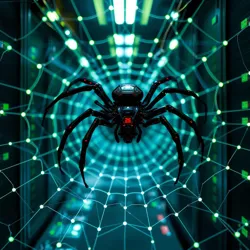Arachnid Security Grids
 A highly advanced Arachnid Security Grid protecting a quantum data center
A highly advanced Arachnid Security Grid protecting a quantum data centerArachnid Security Grids (ASGs) are sophisticated defense networks composed of synthetic spider-like robots that create and maintain intricate webbing made of quantum-responsive filaments. Developed in 2165 by Webtech Industries, these systems represent a revolutionary approach to both physical and digital security through biomimetic engineering.
Technology
The core of an ASG consists of specialized mechanical arachnids that produce and maintain webs of highly sensitive detection filaments. Each strand contains millions of quantum sensors capable of detecting various threats, from physical intrusion to electromagnetic disturbances. The synthetic spiders continuously modify and repair the web structure using advanced molecular weaving techniques.
Web Composition
The security webs are constructed from: - Nano-scale quantum sensors - Crystalline fiber matrices - Self-repairing molecular structures - Electromagnetic detection nodes - Bio-quantum processors
Applications
Physical Security
ASGs excel at protecting physical spaces through: - Motion detection at quantum sensitivity levels - Invisible barrier creation - Intruder capture and containment - Environmental monitoring
Digital Defense
The quantum properties of the web filaments allow ASGs to: - Detect unauthorized data transmissions - Create secure communication channels - Shield against electromagnetic attacks - Process distributed calculations
Maintenance
The mechanical arachnids perform continuous maintenance through: - Real-time damage assessment - Automated web repair - Quantum thread optimization - Pattern adaptation based on threat analysis
Recent Developments
Latest innovations include the integration of neural-web interfaces that allow direct human operator connection to the grid consciousness. This advancement has significantly improved response times and threat assessment capabilities.
See Also
- Synthetic Web Architecture
- Quantum Security Systems
- Biomechanical Defense Networks
References
- Journal of Synthetic Security
- Arachnid Engineering Quarterly
- Quantum Web Dynamics Review